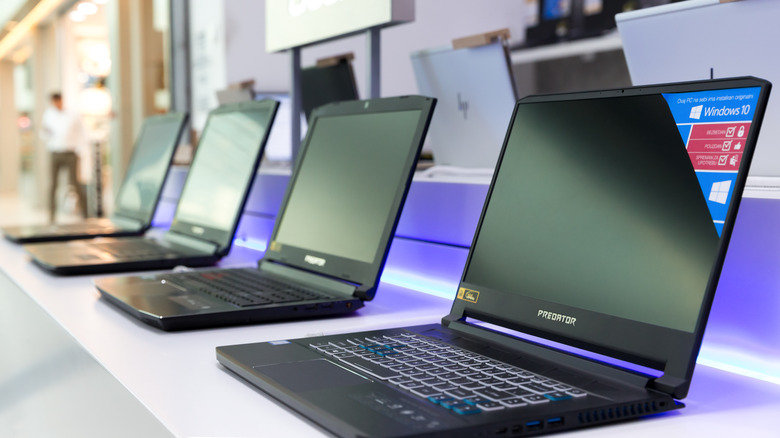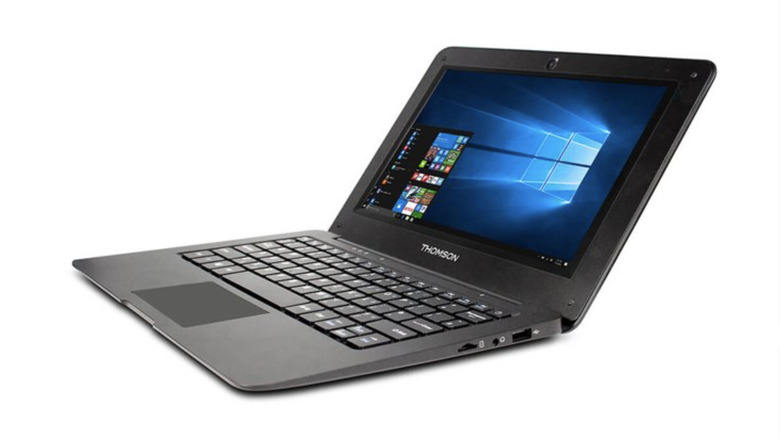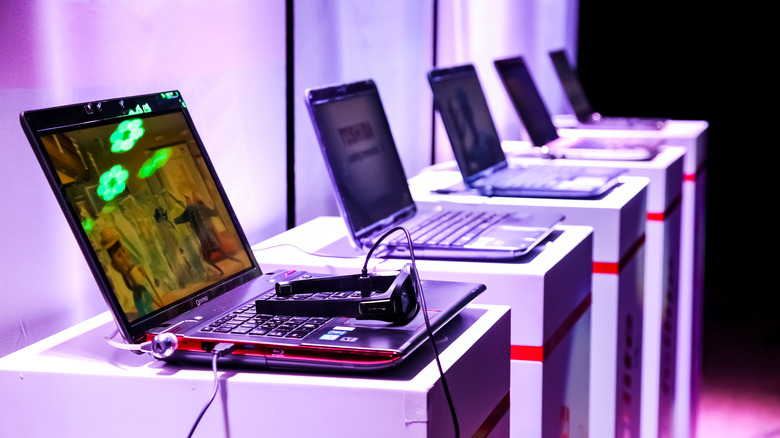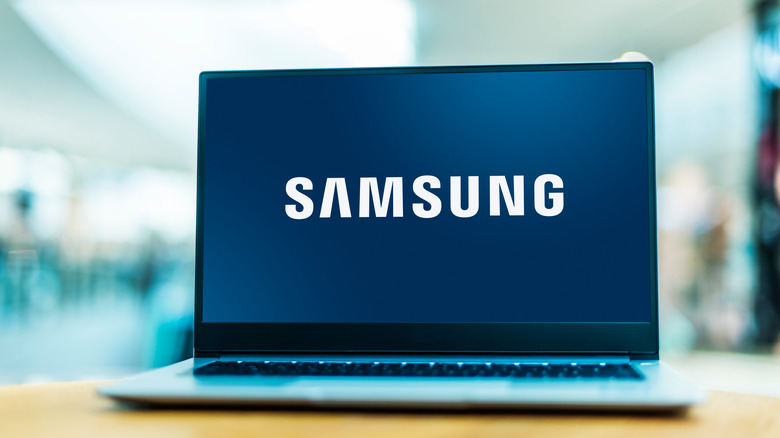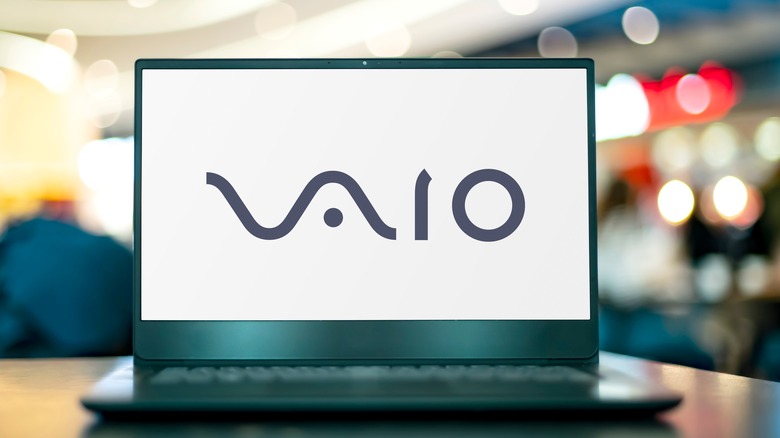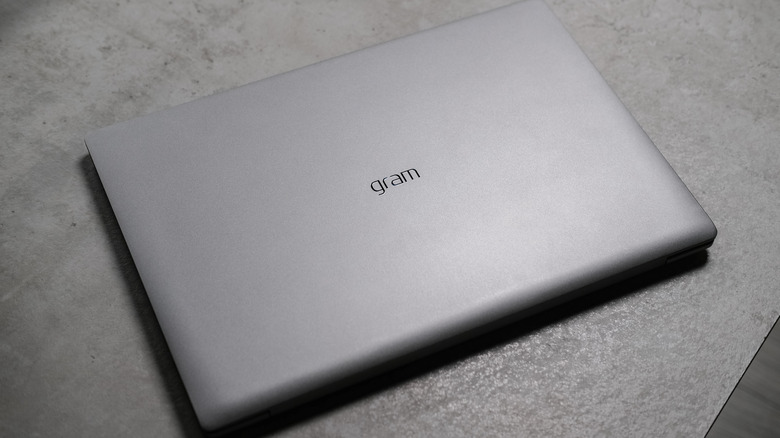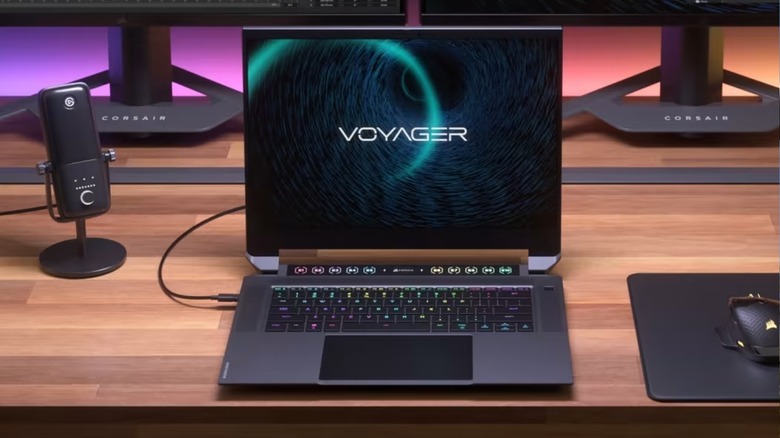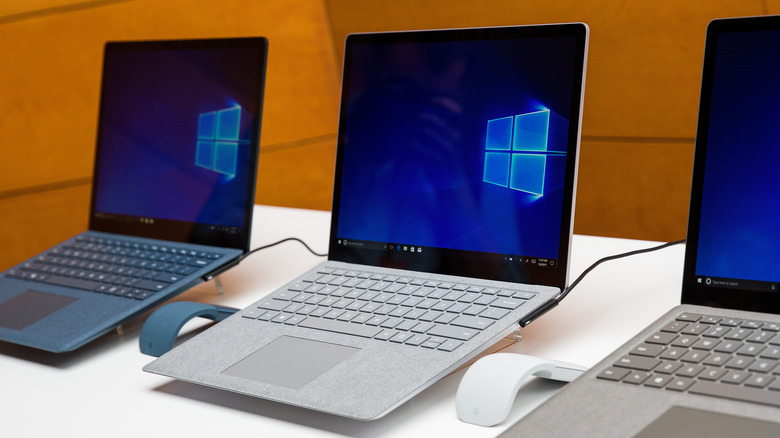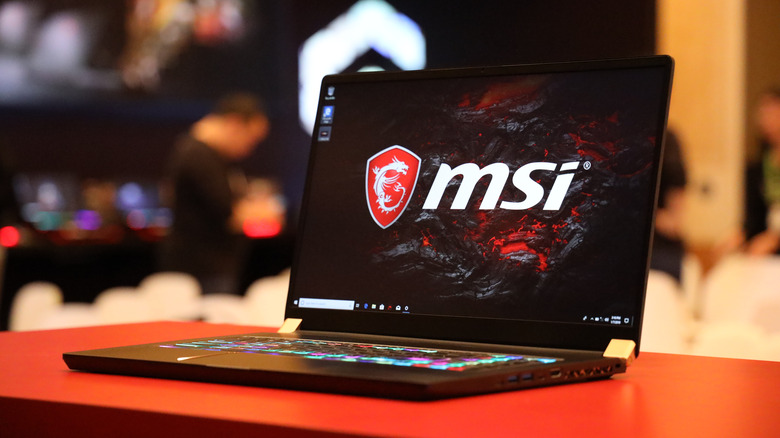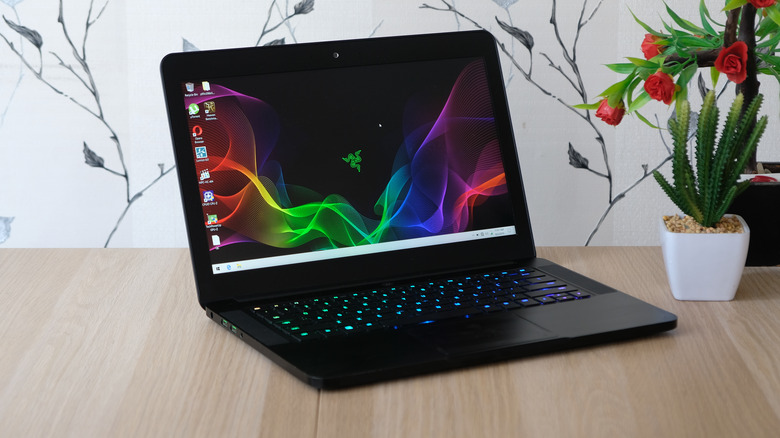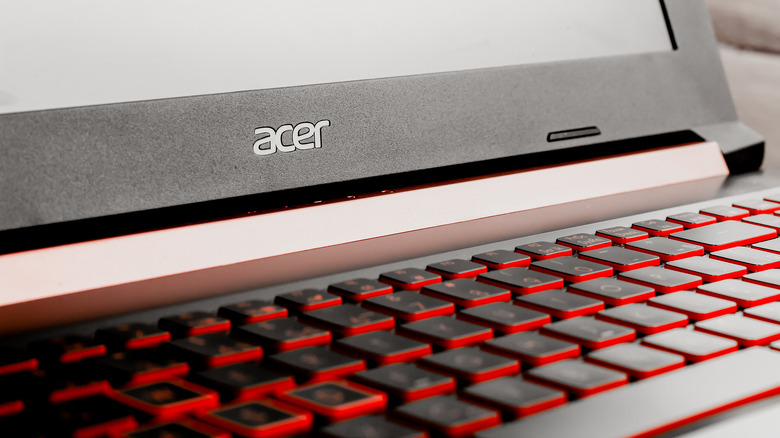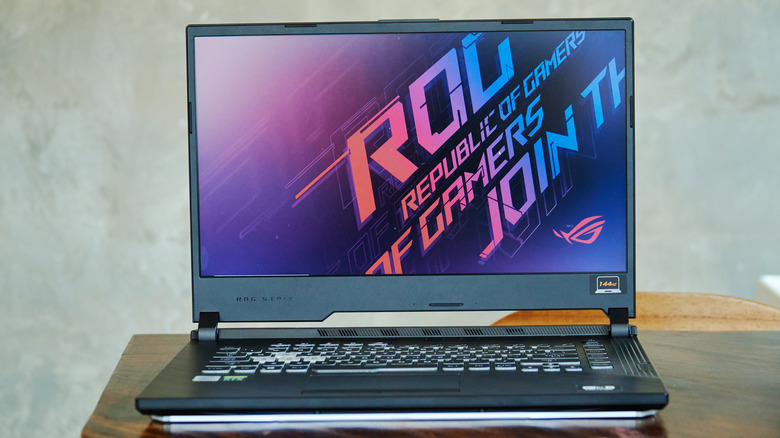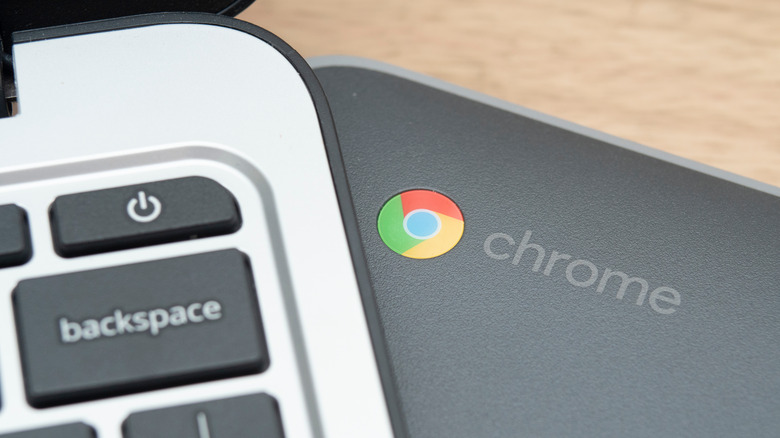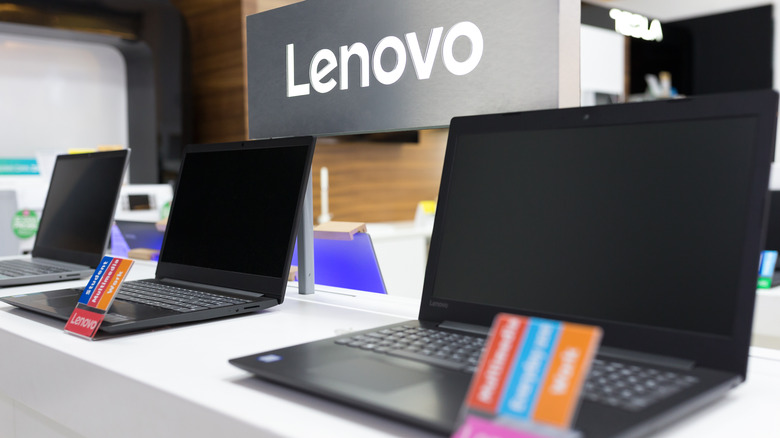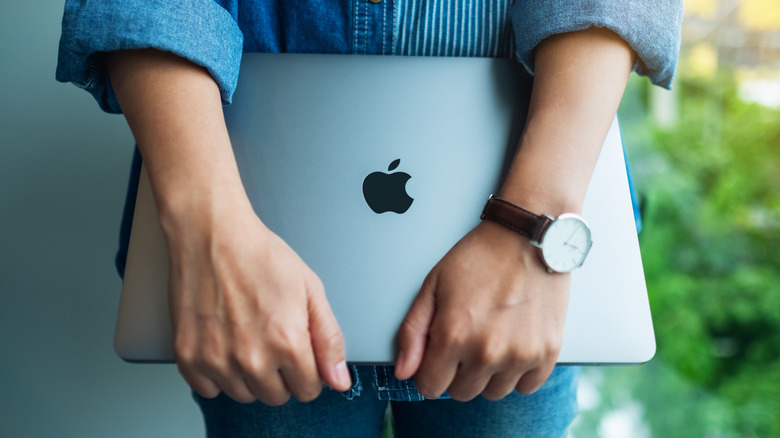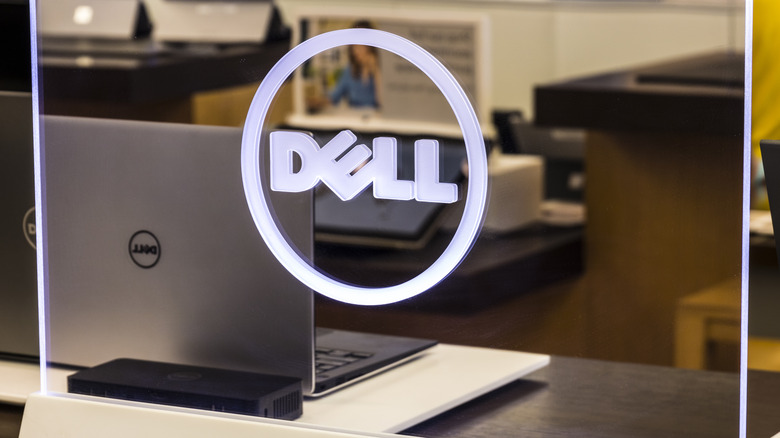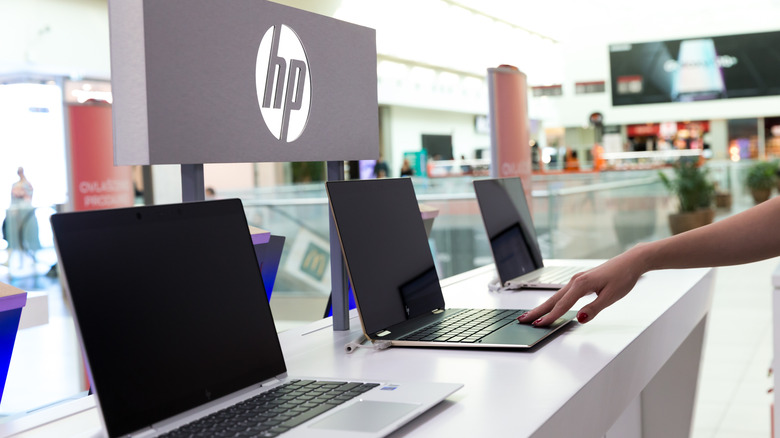Every Major Laptop Brand Ranked Worst To Best
In today's day and age, laptops fill a larger void in the PC market than ever before. Computers, in general, can bridge the gap between productivity and leisure, but laptops introduce the added bonus of convenience. As technological advancements have been made, computer manufacturers can pack their laptops with more power and features, making them preferable to desktop PCs for many. As such, the laptop market has been flooded with marquee brands looking to leave their mark, and it is up to the consumer to decide which brands are worth trusting and which are worth steering clear of.
Whether you're a creative professional seeking a powerhouse notebook for graphic design or a student searching for a budget-friendly Chromebook companion, there is sure to be a laptop that fits your needs. The best laptops are typically the ones that pack the best performance for the least amount of investment, but there is sometimes more to it than that. Some laptop brands skew towards durability, while others prioritize a high-end screen or longer-lasting battery life. Hopefully, this list helps you make an educated decision when the time comes to pick up your next laptop.
Here is every major laptop brand ranked from worst to best.
Thomson
Budget laptops will always occupy a unique space in the market, as consumers are always looking to get the best bang for their buck. That said, there are plenty of budget brands consumers should be leery of, starting with Thomson. Thomson is a French electronics company that has been in business for well over 100 years, though its brand lacks the visibility of others, and perhaps for good reason. The company's laptops, despite touting a solid set of features, are lacking in performance to such an extent they might not be worth the small investment.
Take the Thomson NEO 14C notebook, for example. At $199.99 on Amazon, this is one of the cheapest devices on the market and should be able to reasonably meet the minimum expectations of a laptop, such as surfing the web and managing files and folders. However, the laptop is powered by Qualcomm Snapdragon, a CPU typically reserved for mobile devices. Snapdragon is excellent for energy efficiency but falls well short of processors from Intel or AMD in the performance department, so Thomson laptops are far from an all-in-one experience.
For the utility they are able to provide, Thomson laptops are more on par with Google Chromebooks, though Chromebooks have the benefit of Google integration, more support, and greater simplicity. As a result, Thomson lacks a true niche in the market and is one brand perhaps worth avoiding.
Toshiba
Toshiba is a name many consumers will recognize for the foothold they have in electronics in general. The company is, after all, one of the few remaining manufacturers of Fire TVs, though its line of laptops leaves something to be desired.
While many prominent laptop manufacturers offer a range of models varying in quality, Toshiba laptops have earned a reputation for pairing simplistic design with subpar quality across their entire lineup. To compound the issue, Toshiba's laptops frequently arrive burdened with an excess of bloatware. Most bloatware applications notably slow the processing speed of the laptop, potentially leading to an unfavorable initial experience for users upon powering up their new device.
One positive surrounding Toshiba laptops is the way in which the company provides its customers with a diverse range of budget-friendly laptops catering to various needs. Some of the company's Chromebooks, for instance, can be acquired for $300 or less. Nevertheless, numerous of Toshiba's budget-friendly laptops lack the increasingly prevalent 1080p display feature found in offerings from leading manufacturers. Consequently, consumers desiring a Toshiba laptop equipped with a 1080p resolution may need to pay up.
In addition to these quality considerations, the company announced in 2020 that it was selling its laptop and PC division, raising doubts about the future of product support for Toshiba devices. Coupled with potential concerns related to customer support and products that often fall within the average to below-average spectrum, consumers should exercise caution before investing in a Toshiba device.
Samsung
Similar to Toshiba, Samsung is extremely involved in the consumer electronics world beyond the PC and laptop market. However, Samsung differs in its immense popularity, which can be attributed to its popular line of Galaxy smartphones, flip phones, and tablets. Still, Samsung falls behind in the PC and laptop market due to a combination of the strength of its competitors and poor-to-middling products relative to cost. Past Samsung laptop designs have suffered from subpar battery life and durability. Yet, unlike Toshiba, this prominent brand has demonstrated recent advancements in both product selection and innovation, giving a modicum of hope to its future.
Samsung has become notable for the Notebook Odyssey, a premium gaming laptop that, albeit costly, boasts a full aluminum casing, distinguishing itself from many competitors still relying on plastic shells. Nevertheless, Samsung's laptops fall on many of the same issues attributable to other Samsung products. Price will always be a major concern with Samsung products, as the company tends to deck its devices out with parts and features that are not necessarily prudent. For example, the Samsung Galaxy Book Pro comes with an AMOLED screen, a variation of OLED technology better suited for portable devices.
VAIO
VAIO may ring a bell for some consumers. For a long time, VAIO was synonymous with Sony's line of laptops that dominated households throughout the 2000s. However, Sony laptop sales fell off a cliff in 2014, which prompted the consumer electronics giant to sell 95 percent of its stake in the VAIO PC business to Japan Industrial Partners.
As a result, VAIO laptops continue to exist on store shelves, albeit divorced from its relationship with Sony. VAIO's name recognition certainly helps its case in 2023, as is the fact that it is manufactured by a company that knows laptops. However, there are a few drawbacks that hinder this brand from carving out the niche in the market it once held.
VAIO's build quality, battery life, performance, and sleek design are all positives but the laptops lack the upside of other major manufacturers. Additionally, while VAIO computers would make for excellent budget laptops, the price point is more on par with mid-range devices. The F Series Notebooks, for example, typically retail for just under $1,000. The impressive battery life on these computers is sure to give it plenty of run with select consumers, but considering the laptop is miscast for what it actually provides, VAIO can never be more than a lower-mid tier laptop manufacturer.
LG
LG has many acute similarities to Samsung in the laptop department. After all, both manufacturers are South Korean companies perhaps best known for their premium smartphones and televisions. They are also both known for the ways in which they are lacking in the PC and laptop market. That is not to say, however, that LG has not produced quality laptops in the recent past.
In fact, the LG Gram has plenty going for it. The laptop is ultra-lightweight and boasts a 16:10 resolution, an upgrade on the typical 16:9 seen in most laptops. Those looking to pay a premium price for a laptop without investing in a gaming laptop and the potentially superfluous features that accompany it should give the LG Gram a deep, long look.
However, premium price is also perhaps LG's greatest detriment in its laptops. The company unveiled its first gaming laptop at CES 2022, the LG UltraGear 17G90Q, which comes packed with a 300hz refresh rate screen. While impressive, this screen commands a high price and may not be worth it if you value image quality over raw frame rate.
Corsair
Corsair is among the industry leader in PC parts and might be particularly familiar to those who build their own workstation, as the company is known for producing some of the very best power supplies, cases, and coolers money can buy. Corsair is also known for its line of gaming laptops, the Voyager series. Voyager laptops give consumers a premium experience with the comfort of flexibility and portability, albeit with a few minor drawbacks that will mean different things to different types of consumers.
The Voyager makes use of a sleek, modern design housed in an aluminum case, which puts it in rarified air in the laptop community. One of the laptop's most notable features is a macro bar with 10 touch buttons and a small center display above the keyboard. The feature is similar to what is seen in modern Macbook Pro models, though for all that the Voyager brings to the table by way of innovation, the laptop falls short in one very important area – gaming performance.
Critics have noticed that since the Voyager is a premium-priced line of gaming laptops, consumers are going to expect unparalleled performance, which many models fail to deliver. Granted, the Voyager a1600, which starts at $2,000, is frequently on sale at outlets such as Best Buy.
Microsoft
It's no secret that Microsoft has left its footprint all over consumer electronics for more than three decades. The company innovated the most popular operating system seen in personal computers today and threw its hat into the gaming arena with the original Xbox in 2001. While the company is still finding its footing with personal computers themselves, its line of Surface Pro laptops has been incredibly popular with consumers looking for an efficient, innovative work experience they can take on the go.
The first thing that sticks out about Surface laptops is the design. Each laptop has a premium build with a sleek and elegant design that comes coated in multiple subtle colors while the charging cable stays out of the way on the right side of the device. There is also some flexibility in the CPU, as some Surface laptops use Qualcomm's Arm-based SQ3 chip, while others use a more standard Intel Core i7. Both have their strengths and weaknesses but offer good performance that can be effectively paired with a fully functional touchscreen perfect for both artists and note-takers.
However, these laptops are not cheap — the mid-level Surface Laptop 5 costs $1,299.99 when it's not on sale — and Microsoft's inability to make laptops for all types of consumers keeps it out of the top tier of manufacturers.
MSI
Micro-Star International (MSI) is similar to Corsair in that it is primarily a manufacturer of PC parts with an eye skewed particularly toward gaming rigs. MSI is also known for its lineup of gaming laptops, which provide consumers with a sound all-around selection depending on their needs. In fact, the company boasts 10 different series of laptops in addition to limited-edition options. MSI's selection, however, does not simply end with the laptops themselves. MSI laptops have screen sizes ranging from 14 to 17.3 inches, in addition to options with an OLED and mini-OLED display. The company also uses both AMD and Intel processors, depending on the model.
For this level of selection, as well as the quality of some of the parts, MSI's machines tend to be pretty pricey. The good news for many consumers is that they can buy laptops directly through the MSI online store in their local region, which occasionally holds sales that make owning a reputable gaming laptop more attainable for most. However, the company's global availability is such that many will need to look to third-party retailers to pick up an MSI laptop.
Additionally, it may be more cost-effective to build a gaming rig with MSI parts than investing in one of the company's many laptops. Nevertheless, MSI is a solid laptop brand and could rank higher among its competitors with a broader consumer focus.
Razer
As far as companies focused solely on gaming clientele, Razer is among the leaders in the quality of the product they produce. This American-Singaporean company is known primarily for two things – their Razer Blade line of gaming laptops and producing PC accessories such as keyboards, mice, and headsets.
The Razer Blade comes in a beautiful chassis with RGB accents and a sleek, efficient design. Consumers also have the option of deciding between both 15-inch and 17-inch models for most Razer Blade laptops. The newest Razer Blade can be purchased with screen sizes ranging from 14 to 18 inches, and the Razer Blade 16 comes packed with more processing power per capita than any other laptop in its size.
The exceptional performance of these laptops does not come for free, in more ways than one. The incredible processing power of the Razer Blade takes a tremendous toll on the battery, so owners of this laptop should be plugged in whenever possible. Moreover, these machines do not come cheap. The 14-inch version of the newest Razer Blade model tops out at $1,999.99, while the 18-inch version will run consumers about $2,899.99 before tax.
As a result, these laptops are among the most expensive money can buy. While most consumers will likely get their money's worth and come away happy, Razer's laptops are not for everybody, capping the company's potential in the laptop market.
Acer
Acer may not be a company that can cater to gamers quite the way companies like Razer and MSI can, but the Taiwanese electronics giant is among the most inclusive laptop vendors in the world. Acer has been making computers for decades and offers a wide variety of laptops at competitive prices.
Acer produces several lines of laptops, but while different MSI laptops may only slightly vary from one another, Acer's all have distinct features that call to the consumer in a unique manner. For instance, the marketing for the Acer Swift series is similar to the Macbook Air in that it is a super lightweight device designed for efficiency. The Acer Spin family of computers, meanwhile, are 2-in-1s.
Acer's range of options also extends to both budget and premium consumers. The company is as reputable of a seller of Chromebooks as any, and gamers are not left out in the cold either. Acer's gaming division, known as Predator, offers the Triton laptop that allows users to take ample processing power with them on the go. The Triton may be particularly appealing for some consumers, as the 300 and 500 series are both available for under $2,000. Those really looking to splurge can also give the Predator Triton 17 X and its NVIDIA® GeForce RTX 4090 GPU a try for $3,799.99.
Asus
Asus, not to be confused with Acer, is another Taiwanese laptop manufacturer that may hold a slight edge over its competitor due to the build quality of its machines and its ability to give consumers a little more for their money. Asus also developed a foothold in the market thanks to its production of other computing parts and accessories such as wireless routers, monitors, and graphics cards. Asus' laptops aim to strike a balance between monetary cost, build quality, and new features, and these are the brands that stand tall atop the market.
Asus has placed a strong emphasis on its Chromebooks, which range from affordable to mid-range from a price standpoint and leave room for innovation. The company's 2-in-1 Chromebook Flip C434 is a great choice for consumers who are looking to dip their toes in purchasing a 2-in-1 machine.
Meanwhile, Asus' various Zenbooks are a great mid-range option for a wide range of consumers, and those looking to spend a little more can buy one with an OLED screen. However, Asus is perhaps best known for its gaming division, Republic of Gamers or RoG. There are currently three lines of RoG laptops: Flow (a 2-in-1), Zephyrus, and Strix. These offerings can get expensive, but those not looking to pay the price can choose a Chromebook or a mid-range laptop instead. If Asus had the overall sales figures at its back, the company would likely be a top-three laptop brand.
Google has been involved in the production of laptop computers since 2011, when they released the first Chromebooks. However, the company partnered with companies like Acer and Samsung to produce the first batch of Chromebooks. These days, Google continues to outsource the Chromebook concept to other manufacturers while producing its own Chromebooks and laptops. The Google Pixelbook Go is the successor to the company's original line of Pixelbooks, high-end Chromebook laptops from the company that originally conceived the idea of Chromebooks (lightweight and web-centric machines) to begin with.
The most recent Google Pixelbook Go continues the lightweight promise of the original Chromebooks. The laptop weighs just two pounds and is just 13 millimeters thick when closed. It also contains a grippable bottom that helps set it apart from its competitors and leans on a battery life of 12 hours to maximize productivity. While consumers should get plenty of longevity out of this laptop, those who like to run the battery down can recharge their device in minutes, with Google claiming the device can gain two hours of charge in just 20 minutes.
The Pixelbook Go also has plenty of other premium features seen in today's top laptops, and consumers can have it in their hands for just $649. If Google ever decides to branch out with its laptop division, it could become a legitimate top player in the market.
Lenovo
Lenovo is an incredibly popular brand of computers. In 2023, the Chinese-based company accounted for 24% of the global PC market share. The reason this brand of laptops is so popular is due to the company's willingness to make products for all types of consumers. Lenovo leaves no stone unturned and backs up its selection of laptops with impressive build quality and customer support. Lenovo also leans on its ThinkPad laptops, which have been incredibly popular in intermediate and secondary schools across the United States. The laptop is unmistakable thanks to the red dot placed in the middle of the keyboard that works as an alternative trackpad.
Lenovo ThinkPads are competitively priced, although not all of these machines are created and priced equally. Finding the laptop that is right for you will depend on your personal need, but Lenovo is a brand that has you covered. Lenovo also has a 2-in-1, the Lenovo Chromebook C330, which strives to give users the desktop experience on the go. Lenovo even covers the gaming portion of its consumer base with its line of Legion laptops, which come packed with a graphics card as impressive as Nvidia GeForce RTX 4090.
Considering that Lenovo IdeaPads can go for under $400 at retailers like Best Buy, this is as well-rounded of a brand as any that deserves its place in the laptop market.
Apple
Apple's influence on the personal computer, laptop, and consumer electronics market goes without saying. A recent study showed that Apple shipped 13.3 percent of all PC units in the United States in the second quarter of 2023 and ranked fourth among vendors for U.S. PC shipments in the same quarter. The MacBook Pro changed the laptop market for the better as a powerful machine that runs on the company's operating system — macOS — while making use of an array of applications designed to eliminate the learning curve for novice users.
Apple has expanded on the MacBook Pro formula several times in recent years, but the price has always somewhat held these laptops back. To combat this and ultimately sell more laptops, Apple produced the MacBook Air, a machine that has the look and feel of the MacBook Pro, albeit slightly stripped down in a thinner, more lightweight casing and at a lower cost for consumers. After all, while the MacBook Pro is great for tasks like video editing that can put a strain on a laptop, not all consumers need such functionality — many simply prefer the ease of access that MacBook laptops provide.
These two laptop lines go hand-in-hand with one another and make the laptop powerhouse that it is today.
Dell
As impressive as macOS is, Apple has a seemingly never-ending uphill battle to become the preferred operating system for consumers. The familiarity most have with Windows machines means the biggest PC manufacturers are tough to topple. Dell is an American company based out of Texas and one of the most recognizable PC brands in the world, in large part due to the popularity of its laptops. Dell's global visibility may be shrinking, however, in light of recent news that the company is looking to move its supply chain away from China.
Nevertheless, Dell remains entrenched as an elite manufacturer of laptops thanks to its wealth of selection, high quality, and strong customer support. The Dell XPS Series is one of the company's signature laptops. The XPS laptop comes in 13, 15, and 17-inch screen size variants, as well as other appealing features and perks such as OLED technology and long-lasting battery life. As a result, it is one of the best laptops money can buy with prices sitting between $899 and $2,249.
Dell's sizeable selection does not end with the XPS Series, however. The company is also known for its Inspiron Series, as well as Alienware, its immensely popular gaming subdivision.
HP
Hewlett-Packard, better known to consumers as HP, is among the world's most visible PC and laptop brands with a 22.5 percent market share in 2023. This has the company positioned behind only Lenovo as the largest PC vendor in the world, but where Lenovo leans on the strength of its budget offerings, HP has more of a selection of mid-range to high-end laptops of tremendous quality. That is not to say, however, that HP does not produce budget laptops. The HP 17-cp2124od retails at around $500 but can often be found on sale for cheaper and comes with AMD Ryzen 3 and 8GB of memory packed inside a sleek, modern-looking design.
HP shines, however, with its mid-range offerings, which consumers are seemingly happy to pay for, given the reviews most HP products accrue. Those who are not on any particular budget should turn to the Spectre series, which utilizes modern Nvidia graphics cards and Intel CPUs to ensure the smoothest experience possible. HP also competes with and compares favorably to its competitors in the Chromebook market thanks to a 2-in-1 touchscreen that retails for just $289 at Best Buy.
As for gamers, HP has them covered with its OMEN and Victus series of laptops. Consumers can rest easy knowing they are getting a quality product from HP, and with such a large selection of devices, HP will remain firmly entrenched among the elite laptop brands for as long as it continues on this trajectory.
